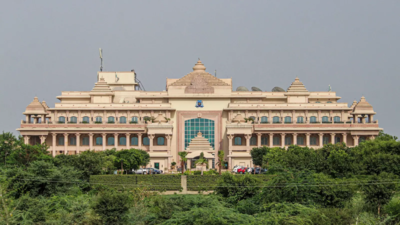Welcome To Latest IND >> Fastest World News
NEW DELHI: The second largest Indian hospitality player —
ITC Hotels
— is now looking at “accelerated growth” following its hiving off as a separate listed company from the eponymous parent group. On Tuesday as its shares were credited to demat accounts of eligible ITC shareholders, ITC Hotels MD
Anil Chadha
told TOI the carved out debt-free company will be “more nimble, agile and attract increased investments”.
“We are well placed across segments from luxury to premium with our six brands. In the last 24 months we have opened 30 properties and as of now 4,000 keys in 45 properties are in the pipeline that will open at a similar pace. From 13,000 rooms in 140 hotels as of now, we will grow to over 18,000 rooms in 200 hotels by 2030 with our asset right strategy,” Chadha said.
The group has come a long way from the first hotel it opened in Chennai 50 years ago, followed by one in Agra and then Delhi’s Maurya. India’s largest and oldest hospitality player — Tata Group’s Taj — had opened its first property in 1903 and currently has a portfolio of 350 hotels including about 120 in the pipeline. According to hospitality consultancy firm Hotelivate, Marriott International has the maximum hotel rooms in India (about 24,000) followed by Taj Group (about 22,000), Radisson (about 14,000); ITC (13,000) and Accor (about 10,000) followed by others.
So apart from unlocking value for the group, ITC Hotels’ demerger is also aimed at accelerating the pace of growth as Indian economy is poised to boom in coming years. On the international front, ITC is setting up two more hotels in Nepal after Colombo, Chadha added. It is getting offers to manage more properties in Sri Lanka.
The parent tobacco major will transfer Rs 1,500 crore to the demerged entity in which it will now be the 40% stakeholder and retain trademarks of popular restaurants Bukhara, Dum Pukht and Dakshin for which it will get royalty. Incidentally, ITC Ltd holds 16.13% stake in Oberoi Hotels’ parent company EIH and has stake in some other hotel companies too.
“About 80% of our pipeline hotels are brownfield (which have a much higher chance of becoming reality that Greenfield projects) that will increase our managed portfolio. The earlier ratio of 45% owned and 55% managed properties will change to 65% managed and 35% owned. The next round of growth will come from upscale and economy segments,” Chadha said.
With its famous restaurant brands, food & beverage (F&B) has been an important part of ITC Hotels’ journey. In pre-Covid times, room rentals and F&B generated almost equal revenue with a significant number of walk-ins coming for dining too apart from residents. Now with tariffs increasing sharply since late 2021, the share of tariffs has gone up to 52% with F&B accounting for 40% and other items like banquets & spas the remaining 8%.
“India is maturing on all fronts and there is an increase in demand across segments. We are not seeing any slowdown in consumption in our industry. We have great assets, fantastic operational efficiency and are well poised to keep pace with our country’s amazing growth. Infra creation happening in India is creating a new wave of demand that was till now seen in tourist hubs abroad — visitors coming for events/expos during weekdays at newly created mega venue like Bharat Mandapam in Delhi or Jio Centre in Mumbai and then using the weekend for tourism before they head home. ITC Hotels is very excited at the next phase of growth that lies ahead,” Chadha said.
Latest IND

